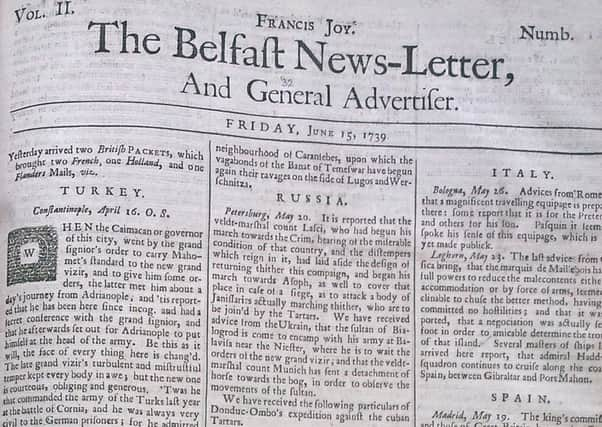Reported On This Day 280 Years Ago (June 26 1739): Turks poison Persian ambassador on the road to Constantinople


RUSSIA.
Petersburg, May 20.
The following is an account of the state of affairs in Turkey, as published in this city, by which it appears, that the Turks poisoned the new Persian ambassador on the road to Constantinople, after which they seiz’d his papers, but were vastly surpriz’d to find that Schach nadir (Thamas Kouli-Kan) had ordered him to declare against the Porte;
[Kouli-Kan, or Schach Nadir, was Iran’s shah]
that provisions are so dear at Constantinople, that a great many Janisarries have been fac’d to sell their arms in order to find subsistance, upon which the grand signior distributed thirty purses among them, to prevent the like practices for the future;
Advertisement
Hide AdAdvertisement
Hide Adthat tho’ the Porte gave orders for bringing troops from the provinces in Asia and Africa, yet not so much as a single man is arrived;
that the Plague still rages in Constantinople, where upwards of 130,000 persons have died of it within these five months, among whom were 52 women out of the the [sic] captain Bashaw’s seraglio;
[a seraglio is a harem]
and, that as the scarcity increases every day, persons in easy circumstances are obliged to content themselves with bread made of millet seed, barley and wheat.
The Seraskier of Oczakow, who is a prisoner here, has receiv’d a considerable sum from Bender towards his maintenance. [A seraskier is an Ottoman miltary leader]
Advertisement
Hide AdAdvertisement
Hide AdWe are assur’d that the prince Dolgo rucki, whom the Czarina has sent her ambassador to London, has a commission to negociate a new treaty of commerce between Russian and the crown of Great Britain.
‘Tis not know what affair is transacting between the two court; but whatever it be, we hear that Mr. Titley, the British minister at Copenhagen, has received orders from his court to act in concert with the Russian minister.
TURKEY. Constantinople. April 16. O.S.
WHEN the Caimcan or governor of this city, went by the grand signior’s order to carry Mahomet’s standard to the new grand vizir, and to give him some orders, the latter met him about a day’s journey from Adrianople;
and ‘tis reported that he has been here since incog. and had a secrete conference with the grand signior, and that he afterwards set out for Adrianope to put himself at the head of the army.
Advertisement
Hide AdAdvertisement
Hide AdBe this as it will, the face of everything here is chang’d.
The late grand vizir’s turbulent and mistrustful temper kept every body in awe; but the new one is courteous, obliging and generous.
‘Twas he that commanded the army of the Turks last year at the Battle of Cornia; and he was always very civil to the German prisoners; for he admitted the officers to his table, and would never suffer their swords to be taken from them.
The Turkish ministers hardly doth say their souls were their own in the late vizir’s time, but now they resume their former dignity; and those who were banished are recall’d.
Advertisement
Hide AdAdvertisement
Hide AdOf this number is the Testerdar, and also the Bashaw count de Bonneval, to whom an order has been sent to return immediately, because the grand vizir is desirous to have him near his person.
‘Tis said he will be treated by the way with the same respect as a Bashaw with three tails.
The Turks seem to wish sincerely for a peace.
[The Ottomans were in a long war with Russia and the Austrian part of the Holy Roman Empire. The grand vizir was the prime minister, and the grand signior the Ottoman emperor. The previous grand vizir had been brutal]
Vienna, May 16, O.S. A courier from the marquis de Villeneuve, the French ambassador at Constantinople, lately arrived at Belgrade with an escorte of 30 Turks, from whence he dispatched another courier hither with dispatches for the Marquis de Mirepoix: Those despatches contain proposals for a suspension of arms; the marquis has communicated them to the [Holy Roman] Emperor, who afterwards shewed them to baron de Barckel, the Russian minister, that he might acquaint his court with the matter. [France was neutral but had diplomatic relations with the Ottomans]